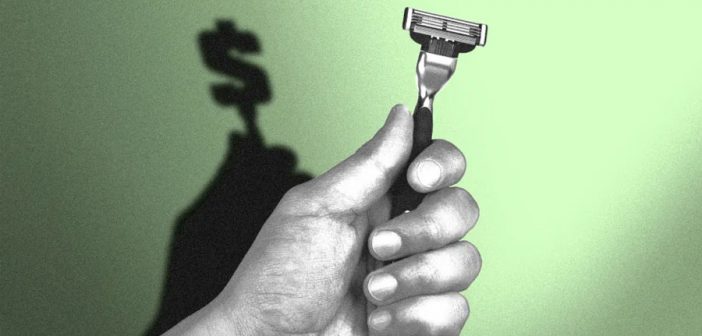From Gillette to Starbucks to Johnson & Johnson, companies love to extol the virtues of their brand, without actually living up to them. Here is what today’s companies could learn from the Quakers, writes Paddle Consulting’s Brian Millar.
This week, Gillette joined the noble ranks of Purposeful Brands with a new ad. It suggested that a decent chap should call out toxic masculinity where he sees it, which was something of a departure from their output of three decades: phallic symbolism that would make Sigmund Freud choke on his cigar.
On the one hand, you could see where Gillette was going. It’s been slashing prices, squeezed by Dollar Shave Club on one side and Generation Beardy Boy on the other. From a strategic point of view, the ad made total sense. There’s just one thing. Purpose is something you believe, not something you make up one day as a marketing strategy. Its social media mentions flooded with women complaining that Gillette’s razors for women are pink and cost more. For a company that makes shaving kits, Gillette didn’t seem to have looked in the mirror.
If @Gillette really want to make a change perhaps they could start by looking at their pink ‘Venus’ range for women that includes names like Passion and Embrace and costs more than the men’s ranges for the same thing. Thanks.
— Caroline Hirons (@CarolineHirons) January 15, 2019
In recent years, companies have been told that they need a purpose, a reason for existing beyond making money. Consumers look for authenticity, and prospective employees want to work somewhere that makes the world better. “Purpose” has been touted as the key to 21st-century success by both the Harvard Business Review and Fast Company.
Johnson and Johnson claims, “We put the needs and well-being of the people we serve first.” Starbucks exists “to inspire and nurture the human spirit–one person, one cup, and one neighborhood at a time.” State Street made a statue of an empowered little girl facing down Wall Street’s bull.
With the world’s top companies staring nobly into the middle distance, it seemed to be the dawn of something magnificent: capitalism with a soul.
LOL, just kidding.
State Street underpays women. Starbucks paid no U.K. corporate tax for three years on sales of £1.2 billion (about $1.5 billion), thus failing to nurture my local neighborhoods by paying for police, social services, or even street sweepers. Johnson and Johnson kept 98% of its cash offshore in 2017–almost $42 billion. If you wriggle out of paying the taxes that cover your customers’ healthcare and education, you don’t really care about the well-being of the people you serve.
Brand purpose is at risk of losing any meaning; it’s already being hilariously mocked.
We need genuinely moral companies to exert their power and tackle the big problems of the day. Besides, high-mindedness can make a company a ton of money. It has done so, over and over again, for centuries.
LEARN FROM THE QUAKERS
When Queen Victoria was still young and athletic, two brothers took over their father’s cocoa business and started making chocolate bars. Their surname was Cadbury so–spoiler alert–this is a success story. They outgrew their factory in the U.K.’s industrial heartland of Birmingham, so they began planning to build a bigger one. They bought land, lots of land; far too much land for a chocolate plant. They had a vision for a factory in a garden, and a town that would grow in that garden. George Cadbury decreed that, “one-tenth of the Estate should be laid out and used as parks, recreation grounds, and open space.” Those spaces weren’t just for Cadbury’s employees. They were for everybody.
George and Richard Cadbury were Quakers. They believed that wealth was meaningless unless you used it to raise the living standards of others. It’s a concept called the Commonwealth, something Quakers exported to America. Quakers have proved remarkably successful in business, founding Barclays and Lloyds, two of the U.K.’s biggest banks, Clarks (of desert boot fame), Nike, and even Sony.
All these companies had founders who believed in a commonwealth, who wanted to create a tide that floated many boats, not just their own. Centuries before anybody said the words “brand purpose,” these companies had it–and flourished because of it. Quakers were honest. Quakers were straight dealers. Quakers paid their debts. There’s a great documentary about them here–but don’t watch it yet, I’m just getting to the good bit.
Right now, purpose is often left in the hands of ad agencies. Every second brief begins, “In a world where everybody is increasingly polarized, at least they can come together over [insert client’s product here].”
It would be better to set the senior management an exam question: What is this company’s commonwealth, and how do we help it to prosper?Patagonia treats the environment as a commonwealth: There’s no point in making great outdoors clothes if the outdoors has become a climate-baked hellscape. It donated its $10 million tax break to environmental charities. If you can easily identify your commonwealth, then you probably had a purpose all along. If you can’t, then I’d advise you to spend some time watching the documentary above.
Cadbury was sold to the food-processing giant Mondelez in 2001. In 2017, Mondelez U.K. managed to pay £122,000 ($157,000) of tax on sales of £1.65 billion ($2.12 billion). Its purpose states that it will be, “Right for our communities as well as the planet.” Yeah, right.
–
This article first appeared in www.fastcompany.com
Seeking to build and grow your brand using the force of consumer insight, strategic foresight, creative disruption and technology prowess? Talk to us at +9714 3867728 or mail: info@groupisd.com or visit www.groupisd.com


